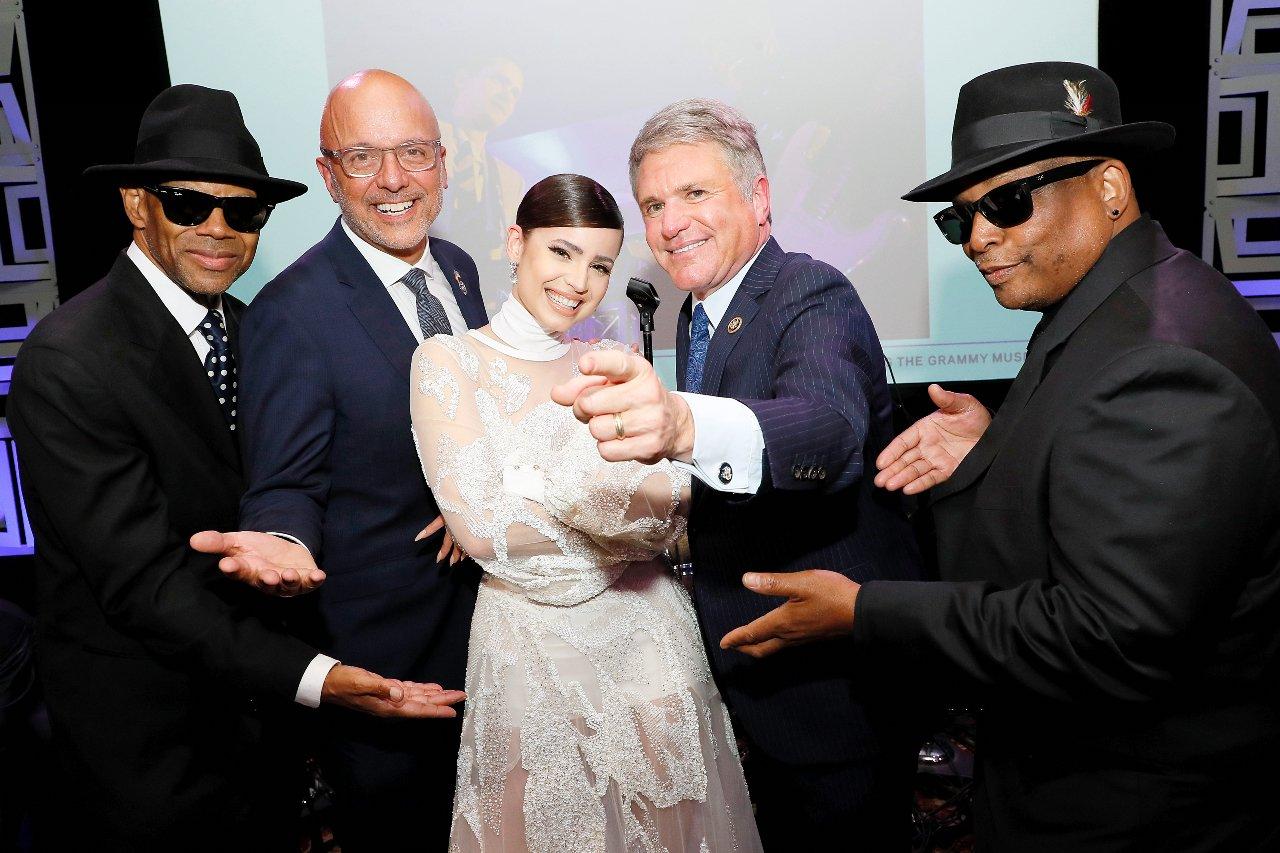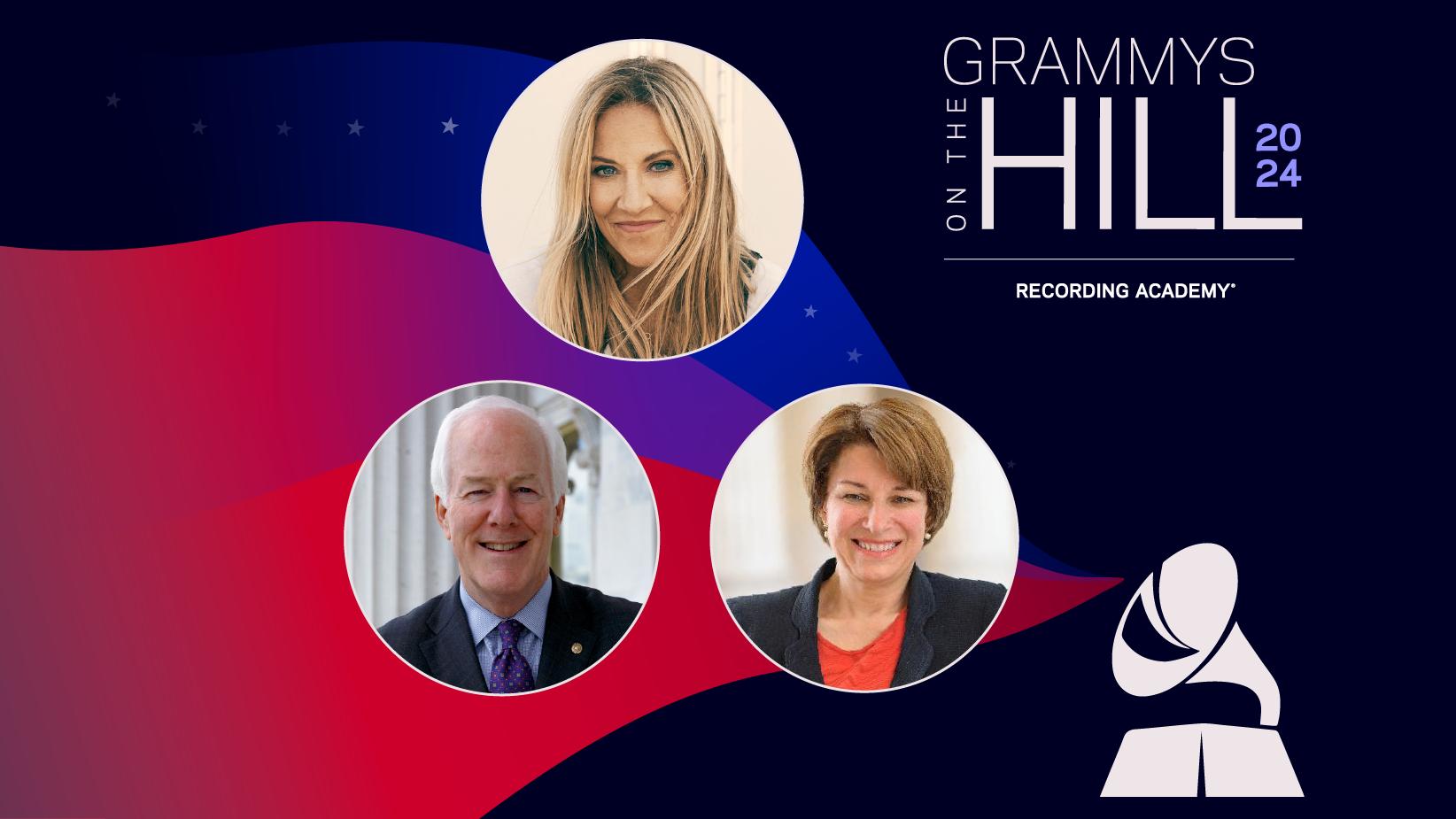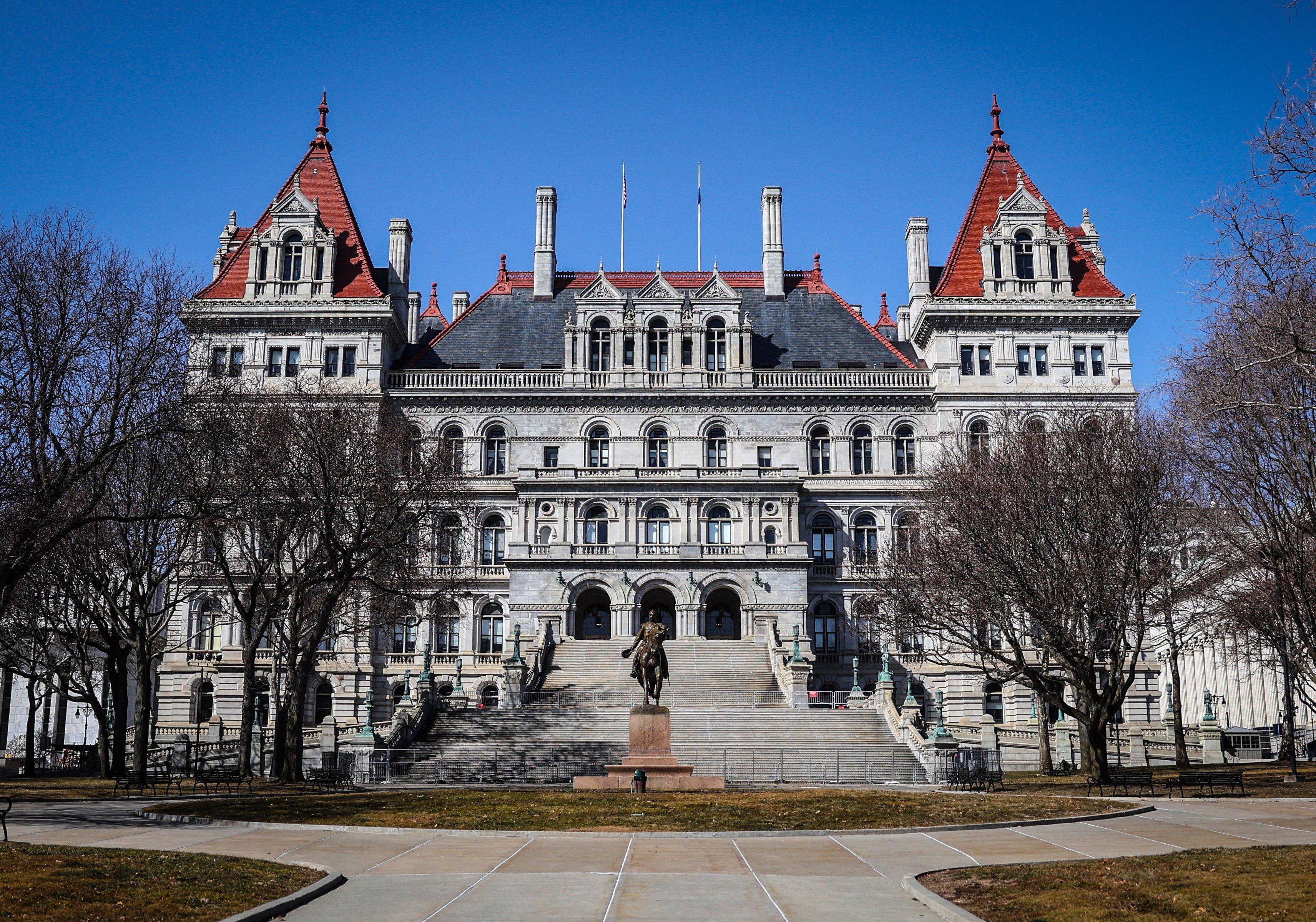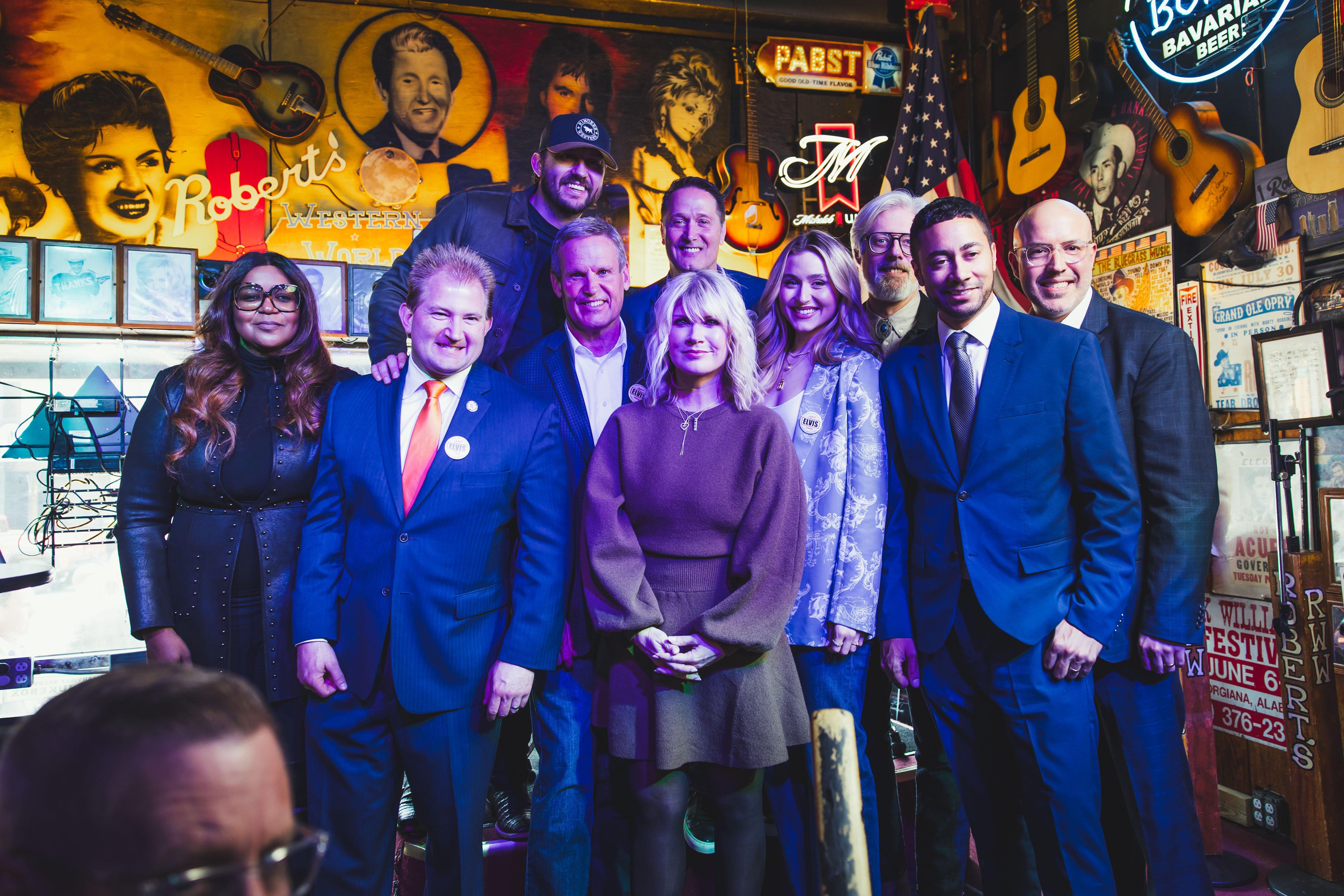Photo: Paul Morigi / Getty Images

(L-R) Jimmy Jam, Rep. Ted Deutch, Sofia Carson, Rep. Michael McCaul, and Terry Lewis
news
How The 2022 GRAMMYs On The Hill Awards Brought Joy, Healing & Reverence For Music People
Featuring key congresspeople and leading lights in the music community, the 2022 GRAMMYs On The Hill Awards was in equal parts celebratory and impactful toward the fight for creators' rights for all music people.
Just before a performance where Jimmy Jam played an enormous keytar and Sen. Amy Klobuchar playfully shook a maraca, Jam laid down his stone-cold genuine feelings about his chosen artform. "Music is the divine art," he told the crowd at the packed GRAMMYs On The Hill Awards ceremony in Washington, D.C., on Wednesday, April 27, as they munched on dinner and dessert and enjoyed an open bar. And he meant it.
"Imagine a life without music," the five-time GRAMMY-winning producer continued. "It would be like breathing without oxygen. It would be like thirst without water. It would be life without the aural sustenance in our souls." Fellow five-time GRAMMY winner Terry Lewis, his decades-long partner who together form the legendary duo Jimmy Jam and Terry Lewis, who were this year's artist honorees at the GRAMMYs On The Hill Awards, concurred: "This is the thing that God gave us to pull us together."
This balance between tireless work and divine play — a bunch of musicians jamming out a few blocks away from the hub of U.S. democracy — epitomized the vision of the GRAMMYs On The Hill Awards, Washington, D.C.'s premier annual celebration of music and advocacy. On the surface, it seemed to simply be musicians having a ball with lawmakers, connecting the spheres of music and politics. But there was nothing at all frivolous or superficial about the intent, as encapsulated in Ledisi's passionate question in her performance: "What can be higher than this?"
Much like MusiCares, the Advocacy division of the Recording Academy is predicated on helping music people in need — in this case, creators and artists who aren't fairly compensated for their labor. This happens to songwriters and music creators, who are regularly financially neglected, too often.
At this year's GRAMMYs On The Hill Awards, which celebrates its 20th anniversary this week, this urgent issue was front and center.
Recording Academy CEO Harvey Mason jr. is one of music's most vocal advocates for fair compensation for creators. A GRAMMY-nominated songwriter and producer by trade, he knows the inner workings of the music business.
"You have to remember, I'm a songwriter," Mason jr. said in an interview on the red carpet at the 2022 GRAMMYs On The Hill Awards. In his experience, he's been paid for his songwriting work. But the landscape is increasingly tilting toward exploitation of his peers. "To get paid $7,000 or $10,000 is not acceptable," he continued. "So that's something I'm very passionate about — in my experience, but also knowing what it takes to be successful."
Other songwriters at the event also echoed this sentiment: Whitney Phillips, Lupita Infante, Emily Warren, Nnenna Freelon, Gramps Morgan, Autumn Rowe, and Emily Bear, the latter three of whom have won GRAMMYs. Although they spoke individually, they came together for a collective higher purpose: a path toward fair treatment and fair compensation for music people, especially after a detrimental pandemic, that can no longer wait. (Gospel singer Yolanda Adams, rappers Bun B and Cordae, gospel group Take 6, and singer/actress Sofia Carson also performed at and/or attended the event.)
"They asked for me to come out here and speak and advocate, and it was a no-brainer for me," Phillips said. "I think what's most frustrating about the songwriter experience is that nobody has known what to do, what to say, who to talk to — what's going to be the most effective way to get this message across that we need to be fairly compensated."
DJs Amira and Kayla performing at the 2022 GRAMMYs On The Hill Awards. Photo: Paul Morigi / Getty Images
Infante, the granddaughter of Mexican ranchera legend Pedro Infante, agrees — and this reality compelled her to become a brand-new Advocacy participant. "I think my music genre is a little bit incoming; I do Mexican music, and there's a big community out there," she says. "I think it's important to have that music protected."
Warren, who co-wrote Dua Lipa's GRAMMY-nominated hit "Don't Start Now," initially tried to highlight advocacy for music people via online posts, but she hit a wall. "I think people don't understand what the [pay] rate is for [music] streaming — why it is that way, what the history of that is, and why it's so hard to change," she says. "I think just making it simple and educating people so they know what to ask for and what they deserve [is important]."
Jazz luminary Nnenna Freelon, who was most recently nominated for a GRAMMY for Best Jazz Vocal Album at the 2022 GRAMMYs, boils it down to eternal family lessons. "What did grandma say? 'Actions speak louder than words,'" she says. "Often, people don't think of the material value of the creation as anything that should be compensated," she added, speaking of the often-invisible role of the songwriter.
Reggae master Gramps Morgan articulates the problem less in terms of dollar signs than of sheer visibility. "If you're not acknowledged, it makes you feel bad," he says. And when he does discuss financial compensation, it's more in terms of the overall system than of applying Band-Aids: "The last time these laws were changed was in the '40s. Now it's time to, as the music has changed and moved forward."
Sofia Carson performing at the 2022 GRAMMYs On The Hill Awards. Photo: Paul Morigi / Getty Images
As singer/songwriter, DJ and activist Rowe puts it, "I got involved with Advocacy, because how can I not? If not, I'm just sitting at home complaining about why things are the way they are." She connects this to our era of no-skin-in-the-game online activism: "You can post all day, you can tweet all day, but you've got to really get out there and get with the people that can actually change your life."
Bear, a pianist straddling the spheres of classical and jazz, says she feels like she regularly gets "the short end of the stick" when it comes to compensation. "I've seen and felt firsthand in the streaming industry era how we can't make a living right now." What of her talented friends? "They have to go back and move in with their parents," Bear laments, "because all of a sudden, touring was gone."
How did these sentiments bear out at the actual GRAMMYs On The Hill Awards ceremony? Through passionate performances and gripping speeches. The 2022 GRAMMYs On The Hill Awards celebrated artist honorees Jimmy Jam and Terry Lewis for their decades of creating iconic songs from artists like Janet Jackson, Mary J. Blige, Mariah Carey, and Boyz II Men, as well as Rep. Ted Deutch (D-Fla.) and Rep. Michael McCaul (R-Texas) for their leadership in supporting the rights of music creators. Despite political party lines, a fierce devotion to music binded them all as friends and colleagues last night.
Rep. Deutch, who spoke first, is the lead Democratic sponsor for the American Music Fairness Act, which, if passed, would pay royalties to artists and producers when their music is played on the radio. (If you didn't know this is a problem, read about it — you'll never listen to the radio the same way again.)
Recording Academy CEO Harvey Mason jr. speaking at the 2022 GRAMMYs On The Hill Awards. Photo: Leigh Vogel / Getty Images for The Recording Academy
"Our nation must nourish the songwriters struggling to make a living and support the producer and artist working in studios with the next potential hit," Deutch said in his riveting acceptance speech. And we do this, he declared, by making sure technology operates equitably to properly compensate creators. Proving his passion is on the line, he proclaimed his decades-long love for Bruce Springsteen, Faith Hill, and the greats of Motown, among other artists.
McCaul has co-sponsored key legislation like the Help Independent Tracks Succeed Act (HITS Act), which updates the federal tax code to bring in line music production with other industries and create parity. He noted that his big-band-loving parents were confused by his love of AC/DC and the Who — and he now feels the same about his kids' obsession with hip-hop. But it's all music, Rep. McCaul said in his acceptance speech — and it adds up to an intergenerational mode of expression.
The night also featured speeches from Todd Dupler, Acting Chief Advocacy & Public Policy Officer at the Recording Academy, as well as Recording Academy Board Of Trustees Chair Tammy Hurt, GRAMMY-winning singer/songwriter Jon Secada, and others.
But what ultimately bridged the music and congressional universes at the GRAMMYs On The Hill Awards? The music, of course: an opening performance of the national anthem with mind-bending harmonies by Take 6 and spectacular performances by Ledisi and Co-Chair of the Recording Academy's National Advocacy Committee and four-time GRAMMY winner Yolanda Adams. And to boot, the house band for the night was composed of Recording Academy members from various Chapters across the country.
By the time everyone in the house got on their feet and the stage erupted into a dance party while Adams performed "Open My Heart," the message of the 2022 GRAMMYs On The Hill Awards was abundantly clear: material change beats big talk any day. It's exactly what GRAMMYs on the Hill has advocated and accomplished: Over the past 20 years, the annual event has led to several major legislative wins for the music industry, most notably the Music Modernization Act in 2018.
And as long as that change is charged with a genuine love of music and music people, nothing can stop that righteous tide.
An Inside Look At The Recording Academy's Congressional Briefings During GRAMMY Week

Photos (L-R): U.S. Senate Photographic Studio; Victoria Will; U.S. Senate Photographic Studio - Frank Fey
news
GRAMMYs On The Hill Awards 2024 Honorees Announced: Sheryl Crow, Sens. John Cornyn & Amy Klobuchar
The annual event hosted by the Recording Academy in Washington D.C., will celebrate music and advocacy by bringing together congressional leaders and artists to honor those who champion creators' rights.
On Tuesday, April 30, the Recording Academy will host its annual GRAMMYs on the Hill Awards, Washington's premier annual celebration of music and advocacy, bringing together congressional leaders and music makers to recognize those who have led the fight for creators' rights.
Sponsored by City National Bank and benefitting the GRAMMY Museum, this year's awards will honor nine-time GRAMMY winner Sheryl Crow and Senators John Cornyn (R-TX) and Amy Klobuchar (D-MN) for their contributions to support music creators. Hosted by singer and actress Candiace Dillard Bassett, the awards dinner will be held at the Hamilton Live in Washington, D.C., and will feature live performances and special guests.
"Protecting the rights of creators lies at the core of the Recording Academy's mission," said Harvey Mason jr., CEO of the Recording Academy. "GRAMMYs on the Hill is an opportunity to celebrate the artists and our nation's leaders who champion this cause, and to acknowledge music's unifying power. We're grateful to Sheryl and Sens. Cornyn and Klobuchar for their tireless efforts in safeguarding the music community and are thrilled to be recognizing them later this month in our nation's capital."
"Receiving this award from the Recording Academy is a tremendous honor for me, because protecting the rights of creators is more important now than ever before,” said Crow. “In this age where technology is changing the world faster than we can adapt, we need clear eyes to see both the opportunities and the challenges ahead, so that artists are not disadvantaged any more than they already are. Music nourishes our humanity, and I am proud to be recognized as an advocate for the protection of the people who make it."
"As a Texan, a love of live music is in my blood, and I've been proud to lead the charge on legislation that helps artists, entertainers, and venues meet the needs of their fans, including the Save Our Stages Act and the Fans First Act," said Sen. Cornyn. "I want to thank the Recording Academy for honoring me, and I look forward to continue to work on behalf of performers and fans across Texas and the nation."
"It's an honor to be recognized by the Recording Academy, an organization that uplifts performers, songwriters, and other music professionals in our country," said Sen. Klobuchar. "Music has the power to bring us together and it is something we can never take for granted. That’s why I fought to pass the bipartisan Save Our Stages Act with Senator Cornyn to ensure independent arts venues survived the pandemic, and why we are working together to improve the ticketing experience with the Fans First Act. There's nothing like live music and concerts, and I remain committed to ensuring artists can continue to share their music with the fans who love it."
Crow has dedicated much of her life to activism, supporting policies and philanthropic endeavors close to her heart. In 2000, she co-founded the Recording Artists' Coalition with previous GRAMMYs on the Hill honoree Don Henley to protect creators' rights and change unfair industry practices. Her advocacy for artists and songwriters continued through congressional testimony, editorials, artist petitions, and more. In 2009, the Recording Artists' Coalition formed an alliance with the Recording Academy to continue its mission as a program within the Academy's Advocacy office. Recently, she has been vocal about the threat that AI presents to music creators, including on her new song "Evolution," which grapples with the future impact of artificial intelligence on humanity and the planet. As a philanthropist, Crow is known for her passionate support of multiple charities, including MusiCares, The Breast Cancer Research Foundation, The World Food Program, Feeding America, ADOPT A CLASSROOM, the Elton John AIDS Foundation, Pelotonia, the Delta Children's Home and many other worthy causes.
Read more: How The Recording Academy Is Redoubling Its Efforts To Protect Creators From AI Risks
Crow is a nine-time GRAMMY winner and was inducted into the Rock and Roll Hall of Fame in 2023. Her first nine studio albums have sold 35 million copies worldwide; seven charted in the Top 10, and five were certified for multi-platinum sales. Her songs defined the third wave of feminism, a rocker's ability to sweep the pop charts without losing any edge and enough wide-open Midwestern joy to captivate the world.
Cornyn and Klobuchar are the congressional honorees being recognized for their stalwart support of creators and their collaborative efforts championing key policies in support of the music community. During the COVID-19 pandemic, Sens. Cornyn and Klobuchar provided a critical lifeline for music through the Save Our Stages Act, which provided $16 billion in federal assistance to shuttered venues and represents the largest federal investment in the arts in U.S. history. In this Congress, they are working to reform live event ticketing through the Fans First Act. Introduced in December 2023, the legislation would address flaws in the ticketing marketplace by increasing transparency, protecting consumers from deceptive practices, and holding bad actors accountable.
The day after the event, on May 1, the Recording Academy will host the annual GRAMMYs on the Hill Advocacy Day, which brings current and past GRAMMY winners and nominees, along with other esteemed industry leaders, to meet with lawmakers to discuss issues facing today's music creators. The day is recognized as Capitol Hill's largest and most prestigious legislative event for music. This year, music creators will convene with members of Congress to advance key issues that the Academy and its members continue to advocate for, including:
Protecting the image, likeness and voice of individual creators from AI fakes through legislative measures such as the No AI FRAUD Act and the No FAKES Act discussion draft.
Reforming the live event ticket marketplace to better protect artists and fans through legislation including the Fans First Act and the TICKET Act.
For the first time in 2024, GRAMMYs on the Hill will expand beyond the traditional two-day event to reflect Music's Biggest Week in Washington. On May 3, the GRAMMYs on the Hill Future Forum will be held in partnership with the Human Artistry Campaign, and will explore the impact of artificial intelligence on the music community.
Since its inception, GRAMMYs on the Hill has hosted award-winning artists and applauded congressional leaders alike, including 13-time GRAMMY winner Pharrell Williams, then-Vice President Joe Biden, two-time GRAMMY winner Garth Brooks, former United States Secretary of State and Sen. Hillary Rodham Clinton (D-NY), four-time GRAMMY winner Missy Elliott, former Sen. Orrin Hatch (R-UT), 28-time GRAMMY winner Quincy Jones, seven-time GRAMMY winner John Mayer, former Speakers of the House Nancy Pelosi (D-CA) and Kevin McCarthy (R-CA), 16-time GRAMMY Winner Alicia Keys, U.S. Senate Majority Leader Chuck Schumer (D-NY), and more. The annual advocacy event has also led to several major legislative wins for the music industry, most notably the Music Modernization Act.
Ticketing Reforms Make A Big Leap In Maryland: Here's What You Need To Know

Photo: Aaron Foster via Getty Images
news
Ticketing Reforms Make A Big Leap In Maryland: Here's What You Need To Know
This legislation introduces a series of pivotal measures aimed at safeguarding consumers and enhancing transparency in the ticketing industry.
The Recording Academy celebrated last week the advancement of improved ticketing reforms as Maryland achieves a groundbreaking milestone with the passage of SB 539. This legislative triumph not only means a new era of consumer and artist protections for live event tickets, but also positions Maryland as a national leader in holding ticket resellers accountable for fraudulent and deceptive practices hosted on their platforms.
"While fans suffer because of this broken system, so do artists" declares a collective statement of support from the Fix the Tix Coalition, which includes the Recording Academy as a founding member. "Predatory resellers view tickets as nothing more than commodities to be traded for outrageous sums, throwing away the cultural and communal value they provide for our society. They exist to undermine the hard work, talent, and livelihoods of artists, inserting themselves as unnecessary and unwanted middlemen who make their money off the backs of the artists and venues who partner to make these events happen."
This legislation introduces a series of pivotal measures aimed at safeguarding consumers and enhancing transparency in the ticketing industry. First, the bill prohibits deceptive practices such as the selling of speculative or counterfeit ticket sales, shielding concertgoers from exploitative practices used by some ticket brokers and resellers. Second, online ticket resale platforms will face increased accountability under Maryland's Consumer Protection Act.
Additionally, transparent pricing practices will be enforced throughout the ticket purchasing process, ensuring consumers have clear and accurate information. Most notably, this includes standards that ensure a breakdown of the face value price, and any fees, is made clear to the consumer throughout the purchase.
"We're getting used to paying these exorbitant prices. It's funny, now if you get a ticket for face value, that's apparently a big deal," stated Delegate C.T. Wilson, who introduced the legislation in Maryland's House. "That shouldn't be a big deal. We've been tricked into accepting this."
The enforcement of SB 539 seeks to dismantle predatory practices that have long plagued the ticketing industry. From the moment a show is announced, genuine fans are confronted with the uphill battle against scalpers and resellers, who exploit loopholes and employ deceptive tactics to profit at the expense of both fans and artists.
"Legislation like SB 539 is vital to protecting fans, preserving equitable access to entertainment, and restoring balance to the currently broken ticketing ecosystem," the collective statement emphasizes. By removing the profit motive from these practices, such as using illegal bots and price gouging, Maryland's bold legislative actions sets a precedent for other states to follow suit in protecting consumer rights and ensuring a better concert experience for fans and artists alike.
The Recording Academy was one of the many stakeholders who actively worked to pass the legislation and will continue to work towards equitable ticketing practices across the country. There is a collective aspiration that the passage of this legislation in Maryland will serve as a catalyst for change at both the local and federal level.
The Academy remains a staunch advocate for ticketing reform, ensuring that every fan can enjoy the magic of live entertainment without fear of deception or exploitation.
The New York State Senate Passes Bill to Protect Creative Expression: Here's What You Need To Know

Photo: Thomas A. Ferrara/Newsday RM via Getty Images
news
The New York State Senate Passes Bill to Protect Creative Expression: Here’s What You Need To Know
Led by Senators Hoylman-Sigal and Bailey, the senate passage of S. 1738 continues the forward momentum for creative expression in New York, signaling the state senate’s commitment to upholding free speech.
In a significant stride towards protecting musicians' creative expression, the New York State Senate passed S. 1738 on March 27. This bill is aimed at safeguarding the free speech of artists, a fundamental part of making music. The Recording Academy has been a staunch advocate of S. 1738, working to advance the legislation in the last two legislative sessions of 2022 and 2023.
Led by Senators Hoylman-Sigal and Bailey, the senate passage of S. 1738 continues the forward momentum for free expression in New York, signaling the state senate’s commitment to upholding the fundamental rights of creators to express themselves through their art. The legislation stipulates that a defendant's artistic works, such as song lyrics, cannot be used as evidence against them in a criminal trial unless it can be proven beyond reasonable doubt that these expressions are admissible.
Researchers have identified nearly 700 cases where lyrics have been used as evidence against hip hop artists, including several dozen in New York. Protecting the First Amendment rights of New York artists is critical to prevent a chilling effect on the state’s music community that plays a vital role in the economic landscape of New York. The music industry in New York contributes close to $20 billion to the state's GDP annually, supporting over 200,000 jobs. From iconic recording studios in New York City to vibrant music scenes in upstate cities like Albany and Buffalo, the state's diverse music community contributes to its reputation as a global hub for creativity and innovation. New York attracts millions of visitors each year to experience live performances, music festivals, and other events throughout the state.
The Recording Academy's support for this legislation in New York is part of a broader effort to champion similar legislation across the country at the state level. In California and Louisiana, the Recording Academy played a pivotal role in passing new laws that solidified the protection of creators' free speech rights. Additionally, in Maryland, Missouri, and Georgia, the Academy has been advancing similar legislation. A recent Advocacy Day in Annapolis, supporting the PACE Act, allowed Recording Academy members from Maryland to meet with legislators and urge them to protect creative and artistic expression.
At the federal level, the Recording Academy has been advocating for the Restoring Artistic Protection Act, also known as the RAP Act since its introduction. Just like at the local level, this legislation aims to protect the First Amendment rights of artists nationwide. Recording Academy CEO, Harvey Mason jr., and Chair of the Recording Academy's Black Music Collective, Rico Love, released a statement during the introduction of the RAP Act in 2022:
"Today's introduction of the RAP Act in the House of Representatives is a crucial step forward in the ongoing battle to stop the weaponization of creative expression as a prosecution tactic," they stated, “ and we will continue to work…to advance the protections in this bill that ensure all artists can create freely without fear of their work being criminalized."
Now, with the successful passage of S. 1738 in the New York State Senate the Recording Academy will continue to work with Academy members to help advocate for this necessary legislation, including bringing Academy members to Albany next month to advocate for the bill’s passage through the state assembly. Ultimately, the goal is to see S. 1738 signed into law, providing much-needed protections for musicians and affirming New York's commitment to upholding the principles of free speech and artistic expression.
As the legislative journey continues, Recording Academy advocates will continue to advance this critical piece of legislation and ensure that the voices of musicians are valued and protected in the state of New York.
A Victory In Tennessee: Governor Bill Lee Signs The ELVIS Act Into Law

Photo: Brandon Hull
news
A Victory In Tennessee: Governor Bill Lee Signs The ELVIS Act Into Law
The signing ceremony hailed as the "coolest bill signing ever" by Gov. Lee, took place at Robert's Western World, an iconic Honky Tonk in downtown Nashville.
On Thursday, March 21, the Recording Academy celebrated an extraordinary moment for Tennessee's vibrant music community as Governor Bill Lee signed the groundbreaking ELVIS Act into law. The signing ceremony hailed as the "coolest bill signing ever" by Gov. Lee, took place at Robert's Western World, an iconic Honky Tonk in downtown Nashville, showcasing the deep connection between music and culture in the state.
Surrounded by Country music stars Luke Bryan and Chris Janson, Gov. Lee emphasized the significance of protecting musicians, acknowledging their role in shaping Tennessee's identity and history. "This industry has helped forge and created the identity of this state" stated Gov. Lee, "and what you've done is not only created and forged our identity and our history here, but much of what is happening in this country."
When discussing the implications of what this legislation means for creators across the state, Gov. Lee highlighted the dangers of AI now being prevented. "[AI] can steal those gifts, it can impersonate those gifts, it can subsequently create fake works that rob those artists of their intellectual property that has made their success, and we can't let that happen. Tennessee should lead on this issue, and we are, this is the first bill of its kind."
Also attending the signing ceremony were Gebre Waddell, the Academy's national Secretary/Treasurer and Chair of the Tennessee Entertainment Commission, artists Natalie Grant and Matt Maher, who testified in support of the ELVIS Act before the Tennessee legislature, and additional artists and elected leaders representing the Academy's Memphis and Nashville Chapters.
In January, the Recording Academy joined Gov. Lee, House Majority Leader William Lamberth and Senate Majority Leader Jack Johnson, and dozens of artists, songwriters, music executives, and industry groups to introduce the Ensuring Likeness, Voice, and Image Security (ELVIS) Act. The Recording Academy's support for the ELVIS Act, including advocacy days and mobilization of music creators, played a pivotal role in the bill's success. By uniting Tennessee's artists and legislators, the Recording Academy spearheaded a collective effort to combat AI fraud and safeguard the authenticity of music creation.
Tennessee has a booming music community that supports more than 61,000 jobs across the state and contributes $5.8 billion to the state's GDP. During the signing ceremony, Chris Janson highlighted his gratitude for this legislation supporting the growing music community in Tennessee. "This is a serious thing. I am a songwriter first; I've always said that; I'm an artist second. I love what I do, I'm grateful for my job, and I am so grateful for leadership who cares." Janson directly thanked the members of Tennessee's General Assembly for supporting this legislation. "We are grateful for you guys protecting our community," declared Janson, "Nashville is nothing without the music community."
The signing of the ELVIS Act marked a historic milestone as the first legislation in the nation focused on safeguarding the core elements of artistic identity, including voice and likeness, in the context of AI. This groundbreaking law updates Tennessee's existing right to publicity, extending protections to songwriters, performers, and all individuals' voices from exploitation by artificial intelligence.
The swift progress of the ELVIS Act through the Tennessee legislature reflects the industry's urgent need for such protections. "The Recording Academy celebrates the passage of the ELVIS Act as a groundbreaking achievement in the effort to protect human creators in the age of AI," said Recording Academy CEO Harvey Mason jr. "This milestone represents the power of collaboration, and it was a privilege to work with our partners in the Human Artistry Campaign, Governor Lee, and the Tennessee state legislature to move the ELVIS Act forward. Today is just the beginning — as AI continues to develop, the Recording Academy and our members will continue to support meaningful legislation across the country that uplifts music people and human creativity."
Looking ahead, the ELVIS Act sets a precedent for future legislation at both the state and federal level. As the Recording Academy remains committed to supporting and protecting human creativity, the ELVIS Act serves as a beacon of hope for music creators everywhere, ensuring a future where artistic expression thrives free from exploitation.
How The Recording Academy Is Redoubling Its Efforts To Protect Creators From AI Risks
